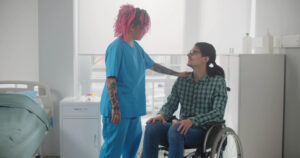Newly licensed nurses must go through one important thing when looking for their first nursing job: The application process. An integral part of the job-hunting and application processes is getting interviewed, which can be stressful and anxiety-inducing for some people. One good way of managing interview anxiety and getting a great first impression is by preparing for your job interview.
This article serves as a helpful guide to help new nurses prepare for their first-ever nursing interview.
Nurse interview preparation tips
1. Do your research
First things first: It’s crucial to understand the role, job description, and main responsibilities of the job you’re applying for. Aside from ensuring that you’re interested in the role, ensure that you have the skills necessary for the position.
After you identify which facilities or organizations you want to work at, take the time to do your research on them by reading up on their official website and social media pages. Not only will this help give you an edge during the interview process, it will help you decipher if the organization you’re about to join has values that align with yours.
2. Bring everything you need and be early
Even though you’ve most likely sent a digital copy of your resume and requirements, bring extra copies of your resume and your original IDs and certificates as well as photocopies. You should also bring pens, a notepad, a compact mirror, and breath mints to your job interview.
If the facility is located where traffic is bad, plot out your driving route in advance to avoid being stuck in gridlock and, consequently, being late. If you’re commuting, familiarize yourself with public transportation schedules online.
3. Mind your nonverbal communications
Studies have shown that it only takes 1/10th of a second to make a first impression on someone. So, it’s important to dress appropriately, professionally, and neatly for your job interview. It’s a good idea to ask the recruiter what the organization’s preferred dress code is. Wear clothes, shoes, and accessories that will make you look polished and professional, and avoid wearing anything too flashy or bright.
Aside from dressing professionally, carry yourself in a professional manner, which you can express via nonverbal cues. Maintain eye contact, speak in a modulated tone, and mind your standing and sitting posture.
4. Be ready to answer typical and situational interview questions
It’s wise to think of, prepare answers for, and practice answering typical nursing interview questions. Doing so will help you express your thoughts clearly and cohesively, give a confidence boost, and reduce stress levels.
While interviewers will ask the typical questions, such as “What made you pursue nursing?” and “What are your strengths and weaknesses?”, you should also be prepared to answer behavioral and situational questions. Despite having just graduated and getting your RN license, you should highlight your nursing knowledge when answering behavioral and situational questions. Draw from your clinical or internship experience to answer these questions. Remember to answer questions with honesty, accuracy, and integrity.
5. Ask questions
Remember that the interview process is not just about landing a job — it’s about learning enough information about an organization to understand its plans and goals. Don’t be shy to ask thoughtful questions during the interview as this signals that you’re interested in the position.
You can ask about what their work culture is like in the unit you’ll be joining, how onboarding and scheduling are done, how yearly evaluations and appraisals are carried out, and how they perform quality improvement projects. You can also ask about career advancement opportunities in the organization.







